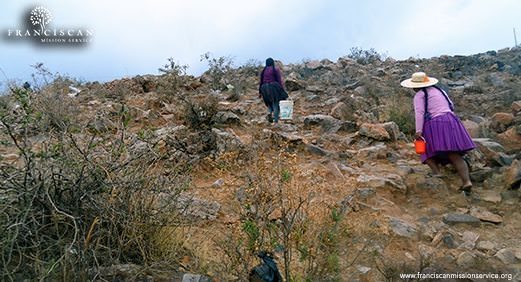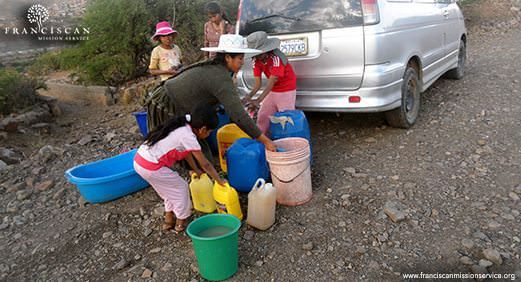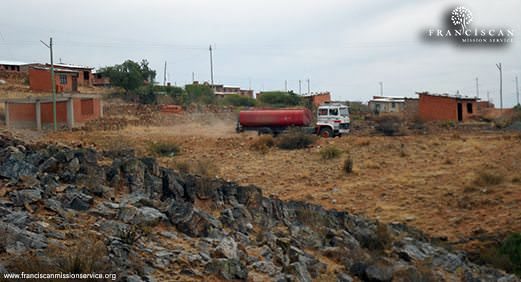Same Water, Same World

Editor’s Note: Missioner Annemarie Barrett reflects on her changed perspective on environmental issues, particularly water consumption, since she’s been on mission in Bolivia.
I know that I have written about environmental degradation before on this blog. And I know that I have already shared stories about the lack of water that we experience here in Cochabamba.
I also suspect that if you are anything like I was, you may read these stories and experience compassion for our sisters and brothers in Bolivia but struggle to empathize with their reality.
Before living in Cochabamba, the threat of a water crisis always sort of mystified me.
It was hard for me to imagine a water crisis because whenever I turned on a faucet, wherever I was, water came flowing out that faucet.
That isn’t true for me anymore.
It hardly rained this year in Cochabamba and we are already feeling the effects of that water shortage. When our apartment runs out of water, we have to give the water service two days notice before they can come fill up our tank. The demand is so high for the water that there is now a two-day wait in line to receive water.
When we do not have water it affects our lives in a lot of really practical ways. Obviously, I cannot shower nor can I flush the toilet. I use the little water that we have saved in bottles to boil rice or potatoes and hope we get water delivered to our home before I run out of water to cook. I cannot wash my clothes or water my plants and I have to ration how much water I give our dogs. I wash my hands less.
It isn’t glamorous and the more often it happens the more scared I become about the future threat of more serious water shortages.
The shortages we experience in the neighborhood where we live are even more serious in the neighborhoods where I work, in Santa Rosa, for example. The families there often have to wait three days for a water truck to even come to their neighborhood and when one finally does arrive it is often not enough to serve all the families that need water that day.
The local dam that plays an essential role in providing water for the whole southern zone of the city and surrounding provinces is already less than 10% full and it will not rain again to fill it back up until September at the very earliest.
The water shortage is real to me now. I have stood on the dry land around the dam and cried, afraid of what may happen this year, next year, and the following, knowing that the effects of the water shortage will disproportionally hurt the poorest families in this city. What will we do if there is not enough water for all of us?
And yet in their infinite wisdom, the women from Santa Rosa taught me an important lesson recently.
While we were in the process of making a short video about the lack of water in Santa Rosa, the women wanted to directly address the people that they believed were wasting water.
I did not understand why, in such a short video, they wanted to focus on the issue of wasting water when they could spend that energy demanding water for themselves.
But in time, and with their help, I learned that these women fundamentally understood something that I had not understood.
Capitalism and privilege had taught me that when I wanted more of something, I just had to work for it or ask for it and it would come.
I had not intimately known the finite nature of resources like water.
In my mind, and my privilege, a water shortage in Santa Rosa meant that we ought to demand water from the local authorities to make water available to the community.
But these women understand a deeper truth. They understand that where there exists a need for water there also exists an excess of water. I learned that in the Quechua language the concept of need is inherently connected to the reality of waste. If one of us is experiencing need then another of us is wasting. The key is balance.

Collecting water from the river to carry to their homes in Santa Rosa (photo credit: women From Santa Rosa)
The women in Santa Rosa know that the whole city of Cochabamba is not suffering equally from water shortages. They also know that in other parts of this city there exists an excess supply of water. They know that their need for water is connected to other people’s waste of water.
We also know that when the water consumption is high in the global north, the global south suffers water shortages. If we were in balance, there would be enough water for all of us. While we are out of balance, we create need.
Now my perspective has changed. Instead of living in the global north pondering water shortages in the global south, I am now living in the global south waking up to the excess consumption of water in the global north. The shift in perspective is devastating.
I invite you to contemplate that change in perspective with me.
As Francis of Assisi modeled for us, I invite you to join us in changing your view of reality to be fundamentally rooted in the perspective of those most marginalized among us. In solidarity with the women from Santa Rosa, I invite you to see that the water that you enjoy is the same water that we need right now in Bolivia. We share the same water. We share the same world.
Reflection Questions: How can you remind yourself of the global implications of your actions? How can you be more conscious about how your daily routine affects the shared world?
Tagged in:

